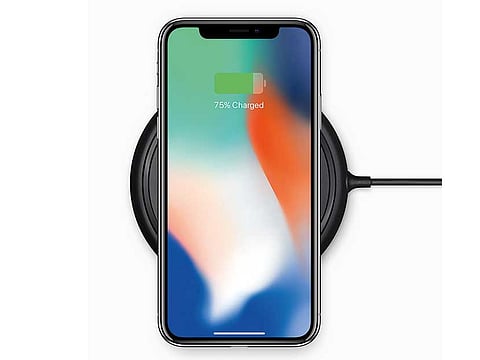With iPhone X, phone is back as a status symbol
iPhone X costs a fortune but Apple knows how to make a call

Forget the brand new design, enormous screen, wireless charging and animoji. One feature of the new iPhone X attracted more attention than any other: Its price. Starting at Dh4,099, Apple has become the first major mobile phone company to break the steep-price barrier. The move comes despite the smartphone boom of the last decade creating massive economies of scale, and advances in processing power allowing companies to produce high-powered gadgets more cheaply than ever.
However, Apple’s unique position means it may be capable of pulling it off. Smartphones have become a crucial aspect of daily life. The modern smartphone contains a set of technologies that little more than a decade ago might have cost thousands of pounds. Steve Jobs introduced the original iPhone as a three-way device — a combination of phone, iPod and internet communicator — but higher-powered modern equivalents do even more. Sat-navs, high-quality digital cameras, games consoles, fitness trackers and, to an extent, personal computers were once bulky and expensive gadgets.
Now they are smartphone apps that can be freely downloaded and weigh nothing. Apps that can order taxis are replacing car ownership for some people. Others are streaming YouTube on their phones instead of watching television.
The utility that some consumers derive from smartphones often makes them the most important item they own, above cars or televisions. As a result, many are willing to pay for the best phone they can get. Apple is able to resist pricing pressures. A welter of highly capable smartphones from manufacturers such as Lenovo, OnePlus and Huawei are on the market for less than half the price of iPhone X, but Apple has a unique power to charge extra for its products and has never had to compete fiercely on price.
The company’s control of the ecosystem of proprietary gadgets and software — iPads, Apple Watches and the regularly updated iOS operating system — protect the iPhone from direct competitors, while other manufacturers all make phones running Google’s Android. Its products are often positioned as a lifestyle: Apple’s retail chief Angela Ahrendts referred to the company’s stores this week as “town squares”.
Supply will be constrained to strengthen its premium. Apple has always been a master of the supply chain, delivering tens of millions of new devices into stores just days after they are announced. Nevertheless, in the first few weeks of a new iPhone going on sale, certain models are often impossible to come by. Apple’s wireless AirPod headphones were released a year ago, but shoppers wanting to buy them online still face delays of several days or weeks after ordering them. The iPhone X, unusually for an iPhone, will not go on sale until November and the company has been widely reported to have had some teething issues in producing them, particularly because of the unique shape of its displays, which are ironically purchased from Apple’s main rival Samsung.
Even when it is released, the difficulties manufacturing the iPhone X suggest it is likely to be available in only limited quantities. This shortfall of supply will only serve to strengthen Apple’s hand when it comes to pricing, not to mention bolstering the phone’s reputation as an ultra-premium product. The price will help it become a status symbol When the original iPhone was released in 2007, its cost gave it a reputation as a status symbol. As the iPhone became more popular, its aura of exclusivity vanished. Apple has also stuck to a uniform design in recent years, maintaining the same iPhone form factor for three years running, four if you include the new iPhone 8, the iPhone X’s more affordable sibling.
The iPhone X, whose design is unmistakably different from previous iPhones, will make an Apple phone a status symbol once again. The iPhone 8 is expected to sell in higher quantities and the X’s price will make it off limits to all but the most devout buyers, giving it a mystique. In this respect, the iPhone X’s price is a feature, not a bug. Luxury is not a concept that has ever caught on in consumer electronics, but making the iPhone a premium product again will be part of its attraction.
— The Telegraph Group Limited, London, 2017
James Titcomb is technology news editor and senior columnist.


